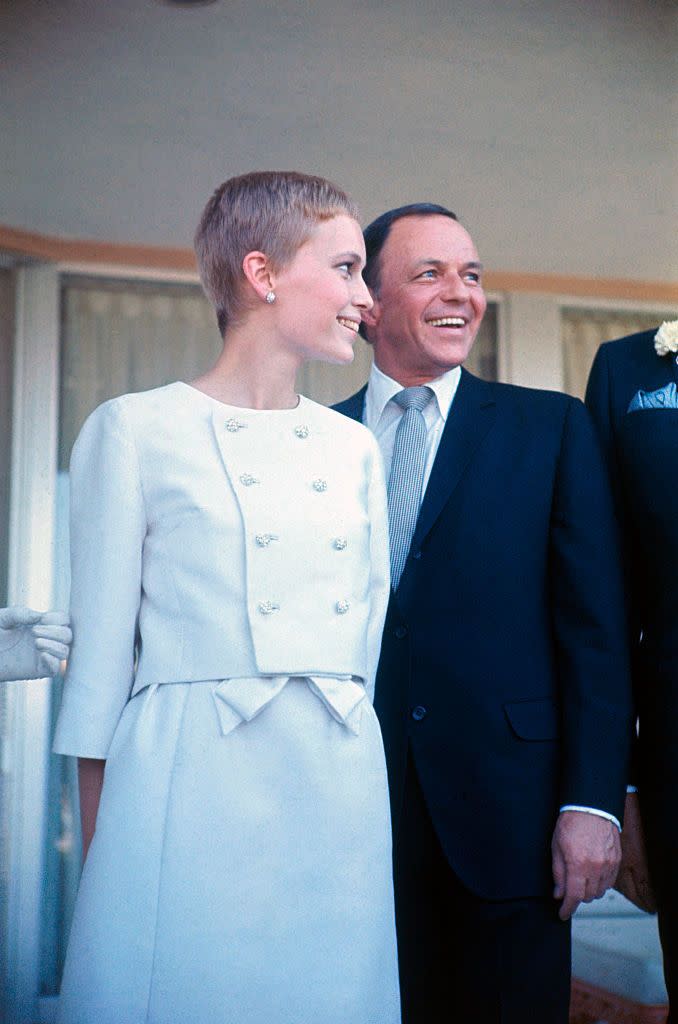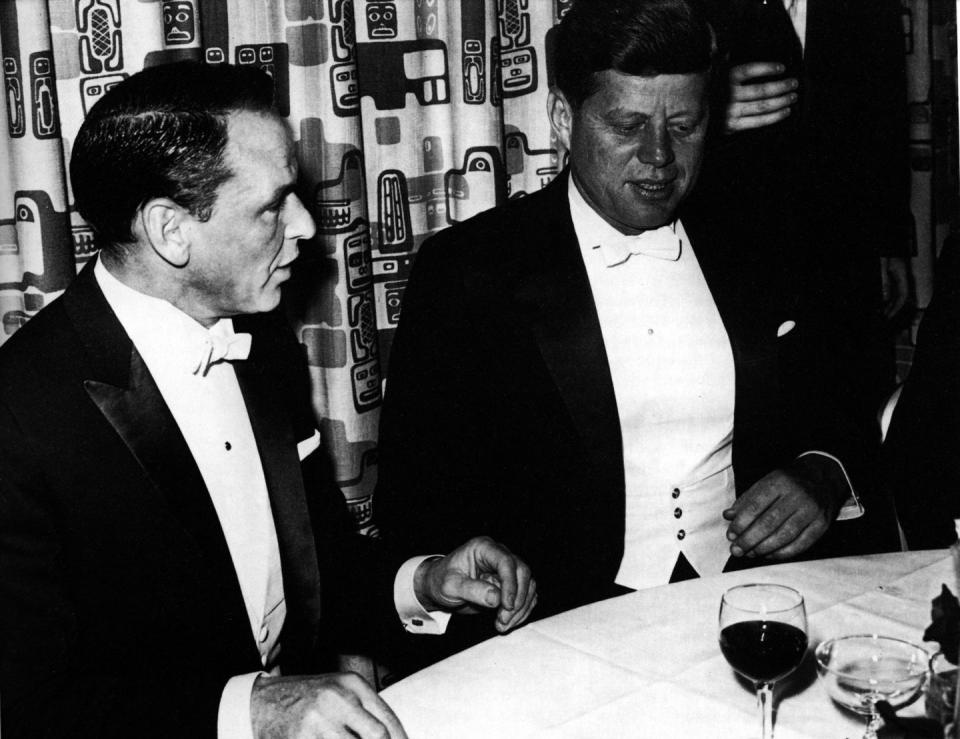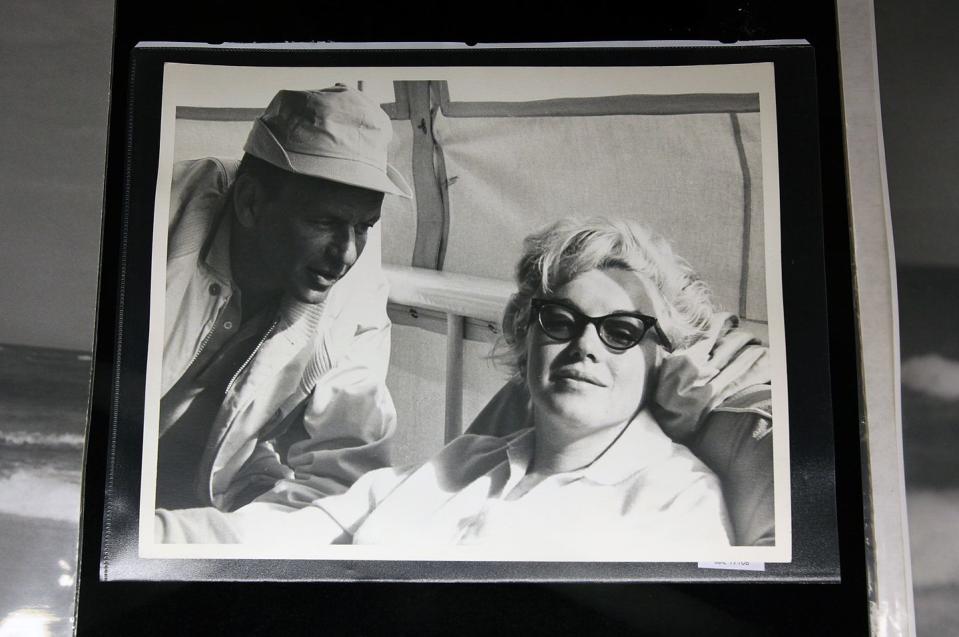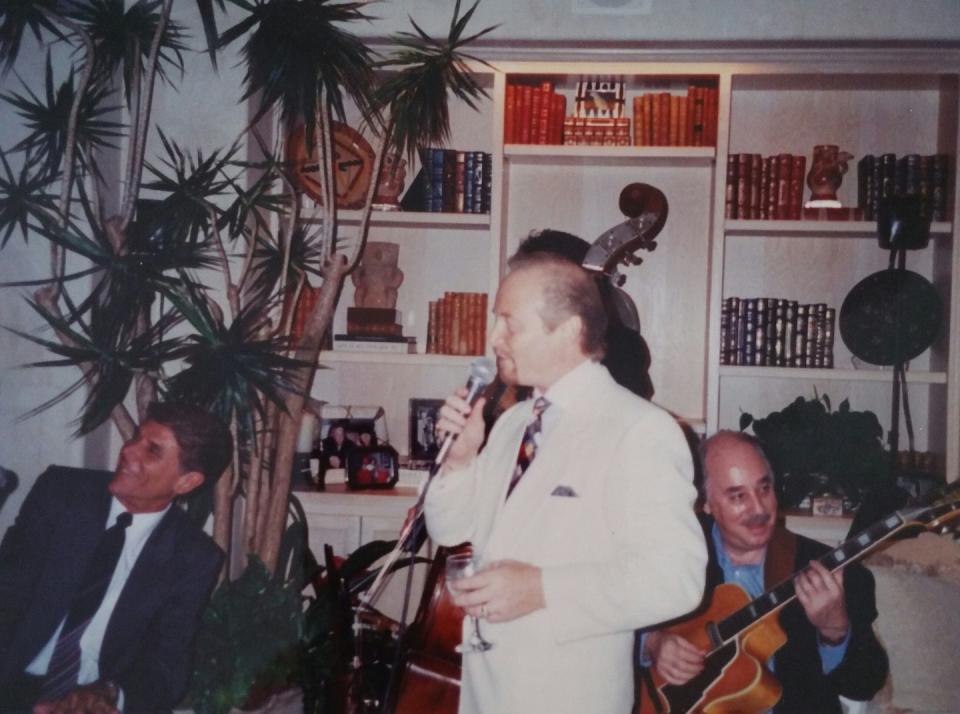No One Knew Sinatra Like "Tony O." For the First Time, He's Telling the Stories Behind Their Friendship.

- Oops!Something went wrong.Please try again later.
- Oops!Something went wrong.Please try again later.
- Oops!Something went wrong.Please try again later.
The first time Tony Oppedisano met Frank Sinatra (a connection facilitated by Sinatra’s confidante Jilly Rizzo at his namesake Manhattan club), the two immediately hit it off. Despite being decades younger than the superstar, Tony, then a fledgling singer, and Sinatra formed a close bond which stretched from the 1970s to the night of May 14, 1998, when Tony was in the hospital room, along with Frank’s wife Barbara, when he passed away. In the intervening time, Tony O became one of Sinatra’s best friends and closest consiglieri; a drinking and smoking buddy Sinatra could lend an ear to, a confidante to help him out or just a guy to goof around with.
It was a unique and intense friendship Tony writes about in his new book Sinatra and Me: In the Wee Small Hours. In the candid memoir, he reveals for the first time the moments he shared with the Chairman of the Board, explaining what it was like to get to know the person behind the American icon. Tony O spoke to Esquire about the book and its many stories, from the singer’s legendary love for women, Sinatra’s role in the Chicago Outfit’s influence in the 1960 election of John F. Kennedy, the death of Marylin Monroe, and whether or not Ronan Farrow is Frank’s son after all.
When it comes to the legend of Frank Sinatra, I’ve always heard the name “Tony O” and you always seemed like this secret figure in the background. Like, who is this mysterious guy so close with Sinatra who goes by Tony O?
[Laughs] Jilly initially hung that nickname on me. He said, “Well, who the hell is going to learn how to pronounce Oppedisano?” And I laughingly said, “Look who’s talking, your own mother named you Ermenigildo and she even called you Jilly.” It’s a name they threw on me and it kind of stuck.
I want to encapsulate your relationship with Frank to give people perspective as to how close you both were. Does any particular story come to mind?
To give you an idea how compassionate and caring he could be, and how down-to-earth and just a regular guy he was, one weekend we were together down in the desert at his compound (in Palm Springs) and I got a call that my father was taken into the hospital. Obviously I was very concerned and not in the most jovial mood, but that night Frank, his wife Barbara and I had dinner, as usual, and then Barbara went to bed. So Frank and I sat in the den as we always did, poured ourselves a drink with the TV on in the background. We’d go out by the pool to have a smoke, come back in the house and he was trying his damndest to change my attitude and cheer me up. At one point, I went into the bathroom off the den and when I came back out to the couch where we were sitting, I’m looking at Frank. I saw that as I was in the bathroom, he emptied his pack of unfiltered Camel cigarettes and he stuck four in each year, about three in each nostril and he had twelve lined up across his month. I’m looking at him like, “Oh, my God” and start to laugh and he’s trying to talk to me and the cigarettes are falling all over his lap and he said, “What’s so funny?” I’m looking at him and I said, “You know, I’ve always heard there’s a fine line between genius and insanity and I think you just erased it.” He said, “Yeah, but I got you to laugh, didn’t I?” And on the other side of the coin, the most important and sensitive thing I did at his request was when he brought (a box of personal keepsakes, awards and trinkets to me) to make certain they got into his family’s hands “when the time is right,” which is how he put it. After he was gone.
One of the most popular articles that Esquire ever published in its long history is “Frank Sinatra Has a Cold” by the writer Gay Talese. It’s a monument to journalism written during an era when Frank wasn’t granting many interviews, so Gay just followed Frank around and subsequently painted a portrait of the man without ever speaking to him. It’s interesting because Gay’s article is such a milestone in the profession and it’s ironic that Frank is even a part of that. I think it goes to show just how vast his influence is. I’m wondering if you ever got Frank’s take on that article, or his thoughts on giving interviews in general?
Well, he chose very carefully the people he would give interviews to. He did something with Bill Boggs back in New York and he did something with Pete Hamill who wrote a book called Why Sinatra Matters. But he just studied people’s work to see they’d be neutral and wouldn’t spin it one way or another. But I do know he had respect for Gay as a writer and as a person. The other side of it is, if you want an interview with Frank, go see him in concert. He’s giving an interview every night with his music. He left us such a legacy and listening to his music is as close to writing a book as he would have gotten. He was the most autobiographical singer in the business because that was his criteria for picking stuff to record. He said, “You look at the lyric and it’s like a script for a play. The lyric gives you something to draw from your own personal experiences which lend it more depth and more meaning.”
I don’t think a lot of people realize that he was one of the first to do that, an artist who spoke about their life through music. He invented the way artists capitalize both creatively and in a marketing sense on their personal life. He did this especially during the tumultuous years with Ava Gardner when he released the album Where Are You?
Yes, with the song “I’m a Fool to Want You.” Frank is also the guy who came up with the idea of having a concept album where all of the tunes chosen had a thru-line. That had never been done before either, that was his idea.
Let’s talk about some of the topics you discuss in your book. Over the years, there’s been murmurings that the journalist Ronan Farrow may or may not be Frank’s son, and it seems to be something everybody loves to speculate about. For people who are leaning towards the idea that he might actually be Ronan’s father, can you tell us what you know about the relationship between Frank and (Ronan’s mother) Mia Farrow at the time? What are your thoughts on the matter?

Well, I never had the opportunity to discuss it with Frank. Mia only started that rumor within the past couple of years, and Frank’s been gone for 23. But at the time that Ronan would have been conceived, I was literally sharing a house with Frank’s longtime accompaniment and conductor Bill Miller. So I had access to Frank’s touring schedule and kept everything. So I went back to look through it all, and found that he was always on the West Coast around the time when Ronan could have been conceived (in early 1987). He happened to have emergency diverticulitis surgery which caused him to have a colostomy bag which he was a little bit tempestuous about. Around that same time, he went to Hawaii to shoot an episode of Magnum P.I. because he was friends with (the show’s star) Larry Manetti. So he had his doctors remove the colostomy bag earlier than it should have been and when he came back from Hawaii, he ended up back in the hospital to have a procedure done because he got an infection and they had to put the colostomy bag back. And shortly after that he was in Atlantic City for a show. And from what I understand, from September of 1986 through the period of time when Ronan would have been conceived, Mia reportedly was shooting a film with Woody Allen on location at their home in Connecticut. And in addition, if you take a photograph of Mia around the same age that Ronan is, you’d swear you were looking at twins. People may say, “Yeah, but he has blue eyes.” Well, I have blue eyes too but I’m not Frank’s kid. I’m Frank Oppedisano’s kid, not Frank Sinatra’s.
I know you also make a point in the book how important family was to Frank and if Ronan was Frank’s kid, he would have never disregarded him.
No, Frank would have acknowledged it. There’s no way that if he had a son or child out of wedlock, he would not have acknowledged that kid. There’s just no way. In addition, in 1987 when it comes to his sexual encounters, after he married Barbara he was probably more devoted to her in that regard than any of his previous wives. So, that’s another aspect. I am thoroughly convinced that Ronan is not Frank’s kid.
There’s an incredible story in the book that takes place in his later years when you’re helping him get changed. He’s naked on the bed and he looks down at his manhood and says something to you.
The story is that we were up all night drinking. The only reason I was helping him get changed into his pajamas, which is something I never did, is that he seemed a little bit unsteady and I said, “You know, all I need is for him to accidentally fall and hurt himself.” I’m kneeling on the floor and I was rolling up his pajama legs, putting his foot through one and his foot through the other and (looking down) he said, “Maronn’! If you could only tell my friend where you’ve been.” I said, ‘Frank, it’s seven thirty in the morning, and I’m really tired. Perhaps it would be a shorter list if he told me where he hasn’t been.” On another occasion, we were joking about the way the press has talked about all of the action he got over the years, especially during his bachelor days, and he laughingly said to me, “Listen, I’m not discounting that I had a lot of fun. But to tell you the truth, if I had gotten the amount of action that’s attributed to me, there are certain parts of my body that would be talking to you from a jar in the Smithsonian Museum.”
You were there the last time Frank and Dean Martin hung out. You also facilitated the last time they spoke. Can you tell me about those moments? What’s it like for you to be a fly on the wall for conversations like these?
It was surreal for one thing. Every once in a while I’d be watching stuff like that go on and somehow I’d be able to remove myself and try to look at it objectively. But it was obviously an honor to be in that position. Once, Dean and Frank were shooting a Christmas special in Burbank and Dean said to Frank that his entire family was going to be at his house later that night for an early Christmas gathering. Dean invited him, Frank said, “OK” and went with Dean to the house. They walked in and looked over a sunken dining room and it’s wall-to-wall people. Dean looked at Frank and said, “Can you believe this, pally? I fucked myself out of a seat.”

But the very last time they spoke it was Christmas Eve 1995 and I was spending the day with Frank before I took a red eye that night to fly to New York to spend Christmas with my parents. We were sitting in Beverly Hills and Frank says, “Geez, I wonder what the hell the dago is doing?” I said, “Well, why don’t we call him?” So I called Dean’s private number and he picked up the phone and he said, “Hey, pally!” I put them on the phone and they had a great conversation which ended with a bit of humor. And the last thing Frank said to him was, “I love you, Dag” and he hangs up the phone. The early next morning when I arrived in New York, my cell phone rang and it’s the private line from Frank’s house. I said, “Oh jeez, now what?” And Vine, his gal Friday, got on the phone and said, “Tony, we just got a call that Dean just passed away.” I got on the phone with Frank and I said, “Do you want me to come back?” and he said, “No, spend Christmas with your parents. I don’t think I’m going to find my wherewithal to go to the funeral, but if I change my mind, I’ll send the plane for you.” But I was very happy to be the person to help him to have a final laugh with Dean before he passed away.
Frank seems like such a giant, but your book humanizes him. We read about how got old like the rest of us and he struggles with the same thing everyone else struggles with when they get older. For example, he had a series of losses of people close to him in quick succession.
In the 80s he lost his arrangers Don Costa, Nelson Riddle and Gordon Jenkins, in 1990 Sammy Davis Jr. died, in 1992 Jilly died, then Count Basie. His world was collapsing around him. I’m just glad to have been there to lend whatever support I could. Another joke he’d make when he’d read somebody passed was, “Well, they’re proving it again. Nobody gets out of here alive.” But part of the purpose of doing the book was hoping to peel back the curtain and allow the world a peek at the man I was privileged to know, which he didn’t show very many people aside from his close friends.
I wanted to ask you about the election of 1960 between John F. Kennnedy and Richard Nixon. There’s been a ton of speculation and reporting as to what went on behind the scenes. The story goes that the boss of the Chicago outfit, Sam Giancana, hatched a plan with patriarch Joe Kennedy to taint the results in Illinois, which at the time was essential to a Kennedy victory. I’m wondering if you can talk about Frank’s connection to all of this and what you heard him say about it?
If you think about it and try to look at it objectively without casting aspersions or throwing rocks, the fact is that Joseph Kennedy made quite a lot of money during the prohibition years running booze over the border from Canada. So it wasn’t that he was without affiliation to (the underworld). But the power brokers at the time that he knew had either retired or passed on. So he just assumed that being Frank knew a lot of wiseguys, like most performers did at the time considering that’s who owned all of the nightclubs, that he would be able to put him in touch with Giancana. Then Joseph Kennedy could ask whatever he wanted, to see if the guys in Chicago would roll up their sleeves and try to help their son get elected to the Presidency. Frank wasn’t physically involved in it, but he did make the connection and said, “Do what you gotta do.” He was very involved in the Kennedy campaign that year, having (his lyricist) Sammy Cahn write a parody to “High Hopes” and that became his campaign song. He campaigned very, very vigorously with Dean and Sammy to help JFK get elected.

Then there’s this famous falling out when JFK’s elected and he’s planning his first trip to Frank’s compound, which Frank outfitted for the President and hoped would become a sort of West Coast White House. But the trip was canceled and the new President stayed at Bing Crosby’s house instead. It was a slap in the face considering Crosby was a Republican, but the thinking went that befriending him was better for JFK’s image than palling around with Frank. Frank was extremely hurt by this. Did Frank say anything about his relationship with Jack after this transgression? Legend has it that they never spoke again.
That’s another misrepresentation that has been repeated over and over again in the press and it’s not accurate. Frank was very hurt; forget how much money he spent in Palm Springs building the facilities for JFK’s visit. The house he had constructed on the far-end of the property had four bedrooms, eight baths with its own kitchen, dining room, swimming pool, and a private entrance and exit. He built additional bungalows for the Secret Service and he even built a helipad. So there indeed was a bit of a cooling off period with JFK after the cancellation. But, Frank told me he did stay in touch with him, but he did it quote-unquote off-the-radar. He said they spoke on the phone, not through the White House switchboard. But they did continue to speak. They had too much fun when he was just a Senator, so the friendship continued when he was President.
He was not that intrigued with Bobby, however, considering what he was doing as Attorney General (holding Senate hearings and summoning the La Cosa Nostra to Washington D.C.). Meanwhile, that’s how his father helped JFK get into the White House and is how Bobby became Attorney General in the first place. Then all of the sudden, he was on a warpath with the wiseguys. Bobby also put J. Edgar Hoover in a very uncomfortable position as well. J. Edgar Hoover had a dossier on everyone and the mob had a dossier on him, so they kind of peacefully agreed to stay out of each other’s worlds. Hoover didn’t want the entire world to know that he was gay. They peacefully coexisted before Robert Kennedy stirred that one up, too.
Add Marylyn Monroe into the mix, another layer to the scandalous early 60s. It’s been said that JFK and Monroe had an affair, and then she had an affair with Bobby. In the book you write that it was Sinatra’s belief that the Kennedys may have had her murdered.
Well he wasn’t quite sure who may have done it, but he was pretty much convinced that she didn’t accidentally overdose. She was supposed to have a press conference the following week where she would have announced that she and Joe DiMaggio were getting back together, but other people had a vested interest in her not speaking to the press. They had their own suspicions and concerns (about what she was going to say). He thought that some people may have acted on those concerns, and that’s how she ended up getting killed. In his mind, it was a triple disaster.
You also explain in the book that Sinatra and Marilyn Monroe were platonic friends and never got together in any other way. Frank knew the difference between a sexual conquest and when someone’s fragile and maybe can’t handle a sexual relationship. Can you extrapolate on that?
Again, that’s the human side of him. That wasn’t the ring-a-ding-ding side of him that the whole world thought. He was concerned about her and he said she was a “fragile, damaged to an extent little child.” If you think about it, the relationships she did have were with men older than she was. It was almost like she was looking for a father-type figure to protect her. None of them did. And Frank couldn’t bring himself to be one of those people just to have some fun physically with her, although he said she was extremely attractive and it wasn’t easy to say no. She wanted to do it, but he just couldn’t bring himself to go there.

Are there things that you left out of the book and that you won’t reveal because maybe you thought, “This is too much and I don’t want to cause a big ruckus.” Or that perhaps they were just too personal?
There were things of a sensitive nature that he confided in me and for all of the reasons you stated above and additionally, there’s no way I could bring myself to break that confidence he put in me by sharing something sensitive. That same question came up when I had my meetings with (my publisher) Simon and Schuster and I said, “There are things I won’t tell and there's two reasons. One is because of a sensitive nature, and the other is that I know things that could probably get me killed.” So one of the people in the meeting said, “Well, why don’t you write both books and we’ll publish the second one after you’re dead.” (Laughs)
Reading the book, it’s so apparent that you were lucky to be in his life. But not only that, he was lucky to have you as a steady hand, a friend and a fighter for him. You were loyal and unwavering in your friendship and you had a personal connection. Big stars have people in their corners and sometimes they don’t have their best interests in mind. But to this day, it seems your love and respect for him shines through.
Well, thank you. I appreciate that. That had a lot to do with Jilly, with the way Jilly was in his life as well. When I first met Frank, Jilly putting his arm around me and saying, “This is a good kid” didn’t hurt. That was the foundation (of our relationship) from the beginning and it stayed throughout. And one of the things is that, like Jilly, Frank knew that if he asked me a question, I was going to give him a straight answer. I might choose my words carefully, but I wasn’t going to bullshit him. When a person in that position with that much power, it’s important that you know exactly what’s going on. And like you said, there’s so many people in power who have people around them who do nothing but blow smoke up their you-know-where. And that’s just wrong. You’re not helping that person by doing that.

Sinatra’s music still pops up all over the place in the public consciousness. In A Promised Land, President Obama wrote that he always listened to “Luck Be A Lady” before debates. Meanwhile they played “My Way” on the tarmac during the last moments of the Trump presidency. That’s not to mention all of the Sinatra that is still played in popular television and films to this day. It’s so indicative of how he’s still a part of the fabric despite being gone since 1998. On a personal level, how do you feel when you hear a Sinatra song today?
If you even think during the height of the pandemic in New York, when people were trying to thank the first responders out of windows every night, they’d play a Sinatra song. And to this day at the end of every New York Yankees home game they play Frank’s recording of “New York, New York.” Some things will never change. When I hear his music, it gives me a charge but it also gives me a little bit of a melancholy. It’s a feeling hard to describe. But I’m thrilled people are still paying homage to him and that’s going to go on for the next hundred years.
You Might Also Like

